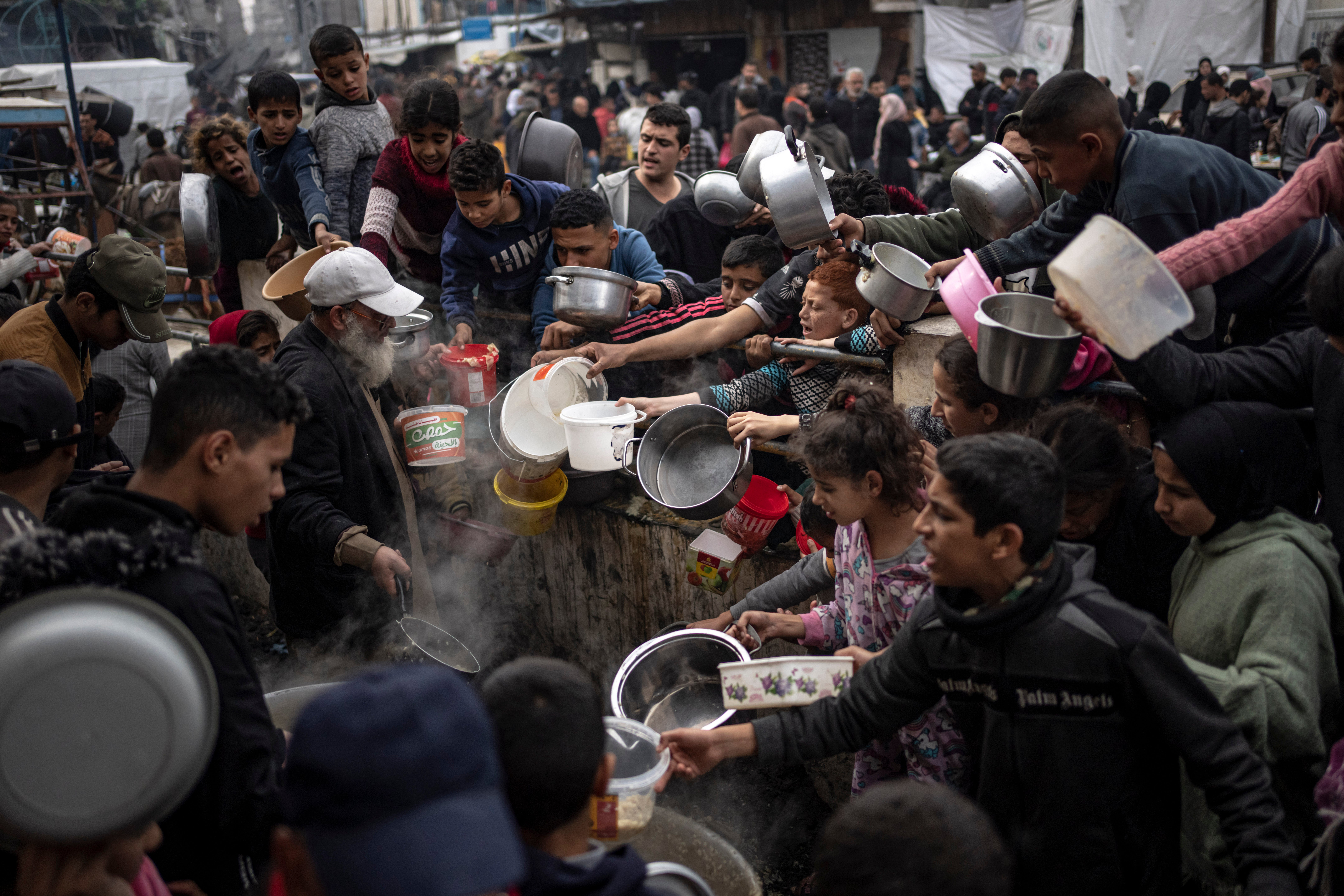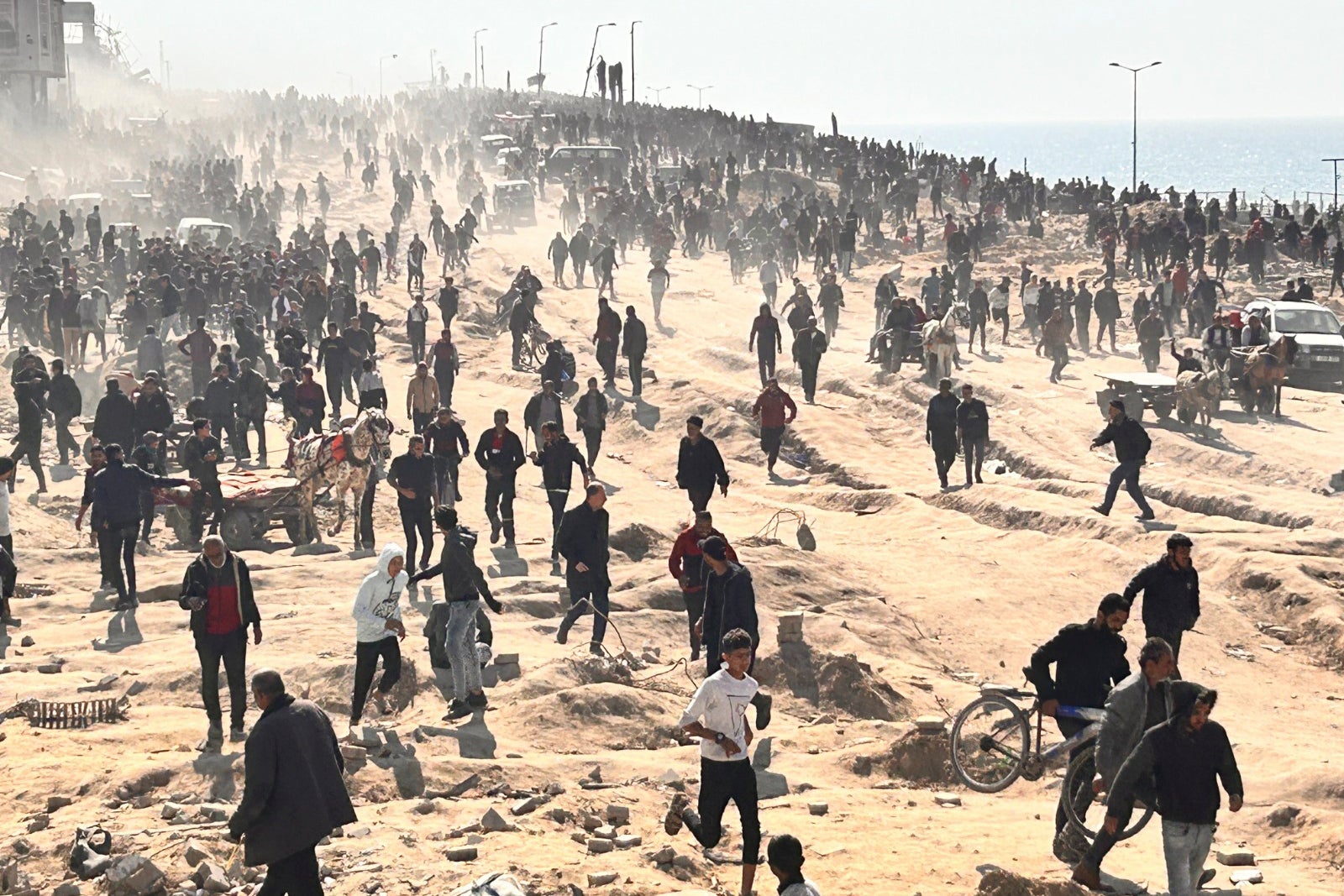Famine looms for a quarter of Gaza as pressure mounts for ‘last chance’ ceasefire
Desperate residents ‘are fighting each other for the last crumbs’

Your support helps us to tell the story
From reproductive rights to climate change to Big Tech, The Independent is on the ground when the story is developing. Whether it's investigating the financials of Elon Musk's pro-Trump PAC or producing our latest documentary, 'The A Word', which shines a light on the American women fighting for reproductive rights, we know how important it is to parse out the facts from the messaging.
At such a critical moment in US history, we need reporters on the ground. Your donation allows us to keep sending journalists to speak to both sides of the story.
The Independent is trusted by Americans across the entire political spectrum. And unlike many other quality news outlets, we choose not to lock Americans out of our reporting and analysis with paywalls. We believe quality journalism should be available to everyone, paid for by those who can afford it.
Your support makes all the difference.A quarter of the population in Gaza is one step from famine and it is suffering from the worst levels of child malnutrition in the world the United Nations has said, as aid groups warned a ceasefire “is the last chance for sanity and humanity to prevail.”
Addressing the Security Council on Wednesday, top UN officials said at least 576,000 people are on the cusp of starvation while virtually the entire 2.3 million strong population is in desperate need of food.
“If nothing changes a famine is imminent,” deputy executive director of World Food Programme Carl Skau warned. Among the worst affected are those who remain in the north of the besieged enclave, where aid has barely been delivered in months, because of the heavy destruction from Israel’s ferocious bombardment and a crippling siege.
Painting an apocalyptic picture, Mr Skau said desperation there was so acute civil order had almost entirely broken down. It has led to WFP suspending aid deliveries after several convoys were stopped by checkpoints, gunfire and other violence as desperate citizens looted food.
“At their destination, they were overwhelmed by desperately hungry people,” he said.
”The breakdown in civil order, driven by sheer desperation, is preventing the safe distribution of aid – and we have a duty to protect our staff.”
Israel has repeatedly denied there is a humanitarian crisis in Gaza, despite the overwhelming evidence of a growing catastrophe. Israel’s deputy UN ambassador Brett Miller told the Security Council on Wednesday that Israel is doing “all it can to care for civilians,” and is working constantly to ensure the entry of humanitarian aid from numerous countries and UN agencies.
Since October, Israel has facilitated the delivery of 254,000 tons of humanitarian aid including 165,000 tons of food, he said.

But speaking to The Independent from southern Gaza, the head of the Norwegian Refugee Council, Jan Egeland, described scenes of similar scenes of aid trucks being mobbed by groups of civilians even as they came through the Egyptian border with Rafah. At one point he said he witnessed gunfire being shot in the air to deter looting.
“People are really now at their limit,” he said. “There are obviously a lot of traumatised people who are now fighting each other for the last crumbs.”
He described watching a queue of one thousand starving people. “They have been lining up for hours because there was a rumour that someone there has chicken. Never ever in my life as a humanitarian have I seen a trapped population that has been bombarded so intensively for so long,” he said.
“There are more dead children here than anywhere in recent memory in any conflict.”
Israel launched a ferocious ground and air assault of Gaza and imposed a crippling total siege, in retaliation for the 7 October bloody attack on southern Israel by Hamas. Militants killed over 1000 people and took more than 240 people hostage, of which more than half remain in Gaza.
Since then Palestinian health officials say that Israel’s bombardment has killed nearly 30,000 people, the vast majority women and children.
A ceasefire is a last chance for some sanity and humanity to prevail
Over 60 percent of Gaza’s homes and buildings have been destroyed or damaged, and around three quarters of the population are displaced.
At least 1.5 million are living in Rafah in makeshift houses and tents as it is the last refuge left in the 42-km long enclave. Many have been displaced multiple times from other parts of Gaza and have told The Independent they have nowhere else to go.
Israel has repeatedly threatened a ground assault into the town, which it calls the “last stronghold of Hamas”, despite UN warnings this would amount to “slaughter”/
Mr Egeland said an attack on Rafah “would be a stain on the conscience of not just Israel but on the countries that have provided arms,” including the UK, the US and Germany.
The families of 136 remaining hostages held by Hamas militants in Gaza have also expressed alarm, telling The Independent they are desperately worried their loved ones could also be killed in the bombardment.
Pressure is mounting on all sides to agree a ceasefire deal – particularly before the holy month of Ramadan, which begins on 10 March and when tensions across the Middle East are expected to flare.
President Joe Biden indicated a deal is imminent, while Downing Street said a truce is “within reach”.
But Israel, Hamas and the Qatari negotiators tasked with nailing down the details sounded more cautious. Hamas officials said there were “still big gaps to bridge”.

Israel has said any deal with Hamas would require the group to drop “outlandish demands”. While Qatar foreign ministry officials said they were “hopeful but not optimistic” of a deal this week.
Hamas is weighing a proposal, agreed by Israel at talks with mediators in Paris, for a 40-day ceasefire that would form the first extended truce of the five-month-old war.
A senior source close to the talks told Reuters Israeli troops would pull out of populated areas under the agreement. But it did not appear to meet Hamas’s demand for a permanent end to the war and Israeli withdrawal, or resolve the fate of fighting-age Israeli men among those being held by Hamas.Delays to a truce are costing lives inside Gaza as the population “at breaking point”, said Mr Egeland who described visiting an industrial building site in Rafah where 27,000 displaced people were living in tents and a school where over 4600 were crushed into classrooms and corridors with just 16 broken overflowing toilets.
“This cannot last for a minute more as it is. There has to be a ceasefire, there has to be general access for supplies,” he said.
“It is a last chance for some sanity and humanity to prevail.”
Join our commenting forum
Join thought-provoking conversations, follow other Independent readers and see their replies
Comments